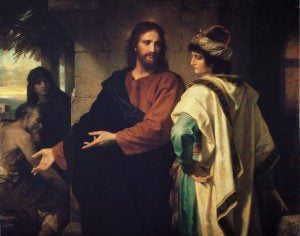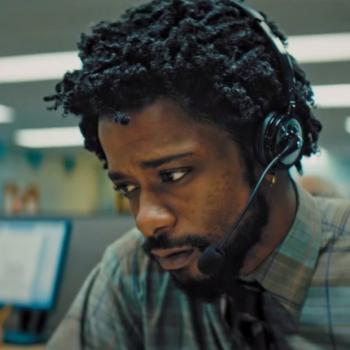This past year I read (or returned to) a handful of both fiction and nonfiction portraits of poverty. Part of the motivation for this reading was the significance of economic inequality as a contemporary political issue (see #feelthebern), but the primary motivation was religious. I have found it very hard to read the Bible, the Book of Mormon, or the Doctrine and Covenants and ignore the claims these texts make about God’s desire that the poor receive attention. This desire is clearly present in the Mosaic Law and burns brighter in the passionate protests of the prophetic books. It is demonstrated persistently in the New Testament’s portrayals of Jesus and then repeated in the subsequent accounts of the early church. The Doctrine and Covenants returns to the question of wealth and its distribution numerous times, as if it is actually serious about its claim that “it is not given that one man should possess that which is above another, wherefore the world lieth in sin” (49:20). The Book of Mormon tirelessly pursues the interests of the poor as well, focusing its determined gaze on divisions of class and their consequences (see Kristin Matthews’ recent Laura F. Willes Book of Mormon Lecture for one survey of the Book of Mormon’s–and LDS church leaderships’–constant concern with inequalities of wealth, learning, and status).
As I’ve reflected on the reality of class divisions and economic disparities, I’ve felt a growing desire to develop deeper relationships with people who live with much less (materially speaking) than I do. I’ve also developed an increasing sense that those of us with wealth have a duty to do much more than meet material needs. So it has been to portraits of poverty that I have turned, rather than to economic theories or policy prescriptions. The latter must be read, critiqued, improved, and implemented—don’t get me wrong. But they don’t capture the lived reality of poverty, and it’s the lived reality of poverty I’ve been after.[1]
Unsurprisingly, there have been obstacles to understanding. The first is that I’ve lived a life of material privilege, and as I’ve already suggested, I don’t spend enough time with those who are truly poor to know their world very well. The second is that most writers who write about poverty are like me in this respect. The time and training necessary to read or write about anything, not just poverty, requires privileges that the poorest among us don’t have. So although it would be wrong to suggest that a writer must be poor herself to accurately perceive any important aspect of poverty, the experiential gap between writers and their less fortunate subjects is at least reason for caution. I wonder whether an orphaned, homeless migrant would recognize herself in Marilynne Robinson’s convincing depiction of the isolating distrust and demoralizing shame of poverty in Lila. And I think there are reasons to challenge the stark melodrama of The White Tiger, Aravind Adiga’s entertaining but sobering picture of the immense and dangerous gulf between rich and poor in modern India.
These concerns led me to nonfiction written by people who have spent years interacting on fairly intimate terms with underprivileged individuals and communities. In A Free Man: A True Story of Life and Death in Delhi, the journalist Aman Sethi spent over a year with one of modern Delhi’s poor itinerant laborers in order to bring some of the sobering realities of urban poverty in modern India to life. Sethi’s experience resulted in a picture that lacks the exaggerated bleakness of Adiga’s novel, but one that was nevertheless troubling and humbling. Alice Goffman offers a similarly colorful but frightening study in On the Run: Fugitive Life in an American City. The book owes its detailed descriptions of the nuanced uncertainties that structure the lives of some of Philadelphia’s urban poor to Goffman’s commitment to experiencing every part of their daily lives. She not only moved into the neighborhood, but became a regular part of the lives of her subjects. She witnessed murders with them, drove them to court or home from parties, and immersed herself in their media.
Of course, these books had their limitations, too.[2] But the observations they had in common helped me pay attention to many things I wouldn’t have before. The best book I read, Katherine Boo’s Behind the Beautiful Forevers: Life, Death, and Hope in a Mumbai Undercity, captured these general observations and underscored the way in which “the poor” are not personality-less, agency-less blots in a homogenous mass. (It is undoubtedly one of the most psychologically perceptive, emotionally affecting, stylistically impressive, and genuinely enlightening books I’ve ever read. If you read just one of the books I’ve mentioned, it should be hers.) The book fixes its eyes on a small group of poor Mumbaikers, and without voyeurism or condescension, it captures the dignity in their suffering, striving, and failure.
Boo spent more than three years getting to know the inhabitants of Annawadi, one of Mumbai’s smaller slums, accumulating numerous notes, video and voice recordings, and thousands of government documents in an effort to tell the story of one particular feud in a neighborhood “booby-trapped with contentions, new and ancient.” Her book captures the monotony of making a meager living by selling rich people’s “vendible excess” (a sadly perfect term for the garbage sold by many Annawadians as the sole economic support for their families) as well as the desirability of such boredom—a successful life was one that avoided any semblance of trouble. It also offers a glimpse of the shame of experiencing a “general indistinction in the mass of need” and the divisions that spring from intense competition among desperate slumdwellers.
The most captivating thing for Boo herself seems to have been the immense courage it takes to be good in Annawadi. Boo’s story demonstrates how vicious the cycle of corruption can be. (An American analogue in this regard is the television series The Wire.) One bad deed justified by challenging circumstances begets another justified by the same. And another. And another. In such conditions, “[t]he crucial things were luck and the ability to sustain two convictions: that what you were doing wasn’t all that wrong, in the scheme of things, and that you weren’t all that likely to get caught.” The corruption of the powerful occasions local misdeeds that turn powerless individuals against powerless individuals—India’s new divide and rule. And this turning of the underclass against itself serves to reinforce the already profound divisions between the haves and the have nots. Boo’s book illustrates countless examples of how rich and poor inhabit, as it were, different universes in modern Mumbai, and Boo is particularly interested in the differences between their moral worlds. “The effect of corruption I find most underacknowledged,” Boo writes in her conclusion, “is a contraction not of economic possibility but of our moral universe. . . . It is easy, from a safe distance, to overlook the fact that in undercities governed by corruption, where exhausted people vie on scant terrain for very little, it is blisteringly hard to be good. The astonishment is that some people are good, and that many people try to be.”
Behind the Beautiful Forevers certainly gave me a greater sense of just how astonished we should be. But as enlightening and transformative as reading the book was, it didn’t change the fact that I must, along with Elder Holland, repeatedly “acknowledge the unearned, undeserved, unending blessings in my life” and recognize that I do not “know how the poor feel.” You don’t understand the good Will Huntings of the world by reading Oliver Twist. More importantly, I’ve learned that this recognition of privilege, if more than a modest gesture, helps me remember that I should expect some mutual incomprehension in my interactions with people who have had less. Differences in manners, language, education, etc. must be negotiated, uncomfortable as they may be, if friendships are to cross class boundaries. Understanding, moreover, is not the end goal; it’s just one part of the project.
Obviously, another part is putting bread in bellies, medicine in veins, and skills in minds and bodies. How to do this is a matter of legitimate debate. Government can be both a problem and a solution. As Boo delicately documents, well-intentioned government programs can have unintended consequences or can be hijacked by corruption. At the same time, defenses of a laissez faire state and the privatization of poverty alleviation can be principled and sincere as well as a cover for greed and apathy. Mormons can and do reasonably disagree about how to fight poverty. (See, for example, Alan Hurst’s review of Richard Davis’s recent book here at Peculiar People.) What we can’t do is replace the moral vision of our scriptures with the moral vision of Ayn Rand.
Mormons don’t need to read Hugh Nibley’s social criticism or Joe Spencer’s recent study of hope and consecration to get this message.[3] We should be as concerned about cozying up to secular ideas relating to wealth as we are to those dealing with sex or abortion. The scriptural mandate to pay attention to the immense human costs of poverty is unmistakable. As President Uchtdorf said in a recent address to the inner city mission of Salt Lake: “We could cover the earth with members of the Church, put a meetinghouse on every corner, dot the land with temples, fill the earth with copies of the Book of Mormon, send missionaries to every country, and say millions of prayers. But if we neglect to grasp the core of the gospel message and fail to help those who suffer or turn away those who mourn, and if we do not remember to be charitable . . . the church is but a facade of the organization God intends for His people.”
Furthermore, if we view poverty in the most common secular terms, we have a tendency to reduce the poor to a frustrating problem that only other people can solve, or, worse, an embarrassment to our collective identity (which is often to say, a problem for the poor to solve mostly on their own). It’s not hard to see this tendency in public discussion of poverty, whatever the political persuasion of the commentators. These treatments of poverty are obviously dehumanizing, but they obscure even more than the selfhood of those who actually experience destitution. The problem of poverty becomes either entirely material or entirely cultural. The poor either need to be given more stuff or they need to cultivate better habits. These narrow remedies are not only naïve and often cruel, but they damn all of us together. Both the rich and the poor need more than money and a good work ethic.
We need to imagine a project that entails more than the eradication of dangerous and demoralizing material and cultural conditions, important as these tasks are.[4] We, rich and poor alike, need to learn to see the poor as more than essentially people in need. “For I was an hungred, and ye gave me meat: I was thirsty, and ye gave me drink: I was a stranger, and ye took me in: Naked, and ye clothed me: I was sick, and ye visited me: I was in prison, and ye came unto me.” These words from Matthew 25’s judgment scene have been familiar to me for as long as I can remember, but not until the last few years have I come to see them as an invitation to be transformed by new relationships, rather than a mere valorization of service to those on the margins. Matthew gives us a Jesus who is interested in other things than low unemployment numbers and character building. Poverty is, rather, an occasion for building communities that are familiar with divine love. If you want to know me and what I desire for the world, Jesus seems to say, find me in the transformative relationships you can create with those who inhabit a more precarious world.
In my experience, the scripture that comes up most often in Mormon discussions of wealth appears in Jacob’s impassioned plea to his people in Jacob 2. “And after ye have obtained a hope in Christ ye shall obtain riches, if ye seek them,” he says. The common conclusion from these words: there is nothing wrong with wanting to be rich, so long as one intends to do good with one’s wealth. It seems clear enough as Jacob continues, “[Y]e will seek them for the intent to do good—to clothe the naked, and to feed the hungry, and to liberate the captive, and administer relief to the sick and the afflicted.” This seems to sum things up, even when the social and individual dangers of riches, which are in ample scriptural supply, go entirely unmentioned. Moreover, we don’t need other scripture to see that reducing Jacob’s words to a recommendation of the prosperity gospel and its philanthropic prospects misses the deeper thrust of his speech, which comes into better focus if we read the whole passage.
Before his discussion of seeking riches, Jacob pleads: “Think of your brethren like unto yourselves, and be familiar with all and free with your substance, that they may be rich like unto you.” And after the discussion, he pleads again: “I have spoken unto you concerning pride; and those of you which have afflicted your neighbor, and persecuted him because ye were proud in your hearts, of the things which God hath given you, what say ye of it? Do ye not suppose that such things are abominable unto him who created all flesh? And the one being is as precious in his sight as the other.” Seeing others with this kind of vision and treating them accordingly is quite the task, and it is certainly easier to maintain from a safe distance. Relationships that unite disparate worlds require the kind of charity that goes well beyond the giving of money or service. They require patience and sacrifice, a willingness to be inconvenienced and to recognize goodness and dignity in unexpected places.
It cannot be repeated enough that the poor need the practical help of the materially fortunate. But the work that needs doing is more than the giving of bread or the offering of shelter. We all need the work because it can, if we let it, save us—rich as well as poor—from pride, shame, isolation, and fantasy (a false sense of God’s favor, a trust in the power of riches, etc.). The consequences of poverty are not born by the poor alone, though those of us with wealth are often blind to its wide-ranging ramifications. Our only hope is in cultivating an unbreakable link between being free with our substance and being familiar with all.
Or, in other words, I need to spend more time with new friends.
[1] I understand that Thomas Piketty’s bestselling Capital intersperses his theoretical argument with various references to descriptions of poverty from classical literature. Whatever the merits of his theory, I applaud the recognition of a need to confront economic inequality in more than merely statistical figures.
[2] For example, Goffman’s concern for the anonymity of her caused her to alter some of the facts of her story.
[3] I can’t help but note Spencer’s debunking of the somewhat common Mormon notion that the law of consecration has been suspended and temporarily replaced by the law of tithing. The guiding assumption behind this idea is, of course, that Mormons engaged in radical economic behavior in a simpler past and will again in a brighter future but don’t have to radically reform themselves now. “I suspect that, at root,” Spencer writes, “[this idea] is motivated by a desperate fantasy, namely, that there once was and again will be some kind of a system that will do my consecrating for me. We displace the force of the law of consecration into the irretrievable past or the indefinite future precisely so that we do not have to take up the difficult work the law prescribes for us right now” (144-45).
[4] The success of a new program combatting homelessness in Salt Lake City is an example of just how important such work can be.













